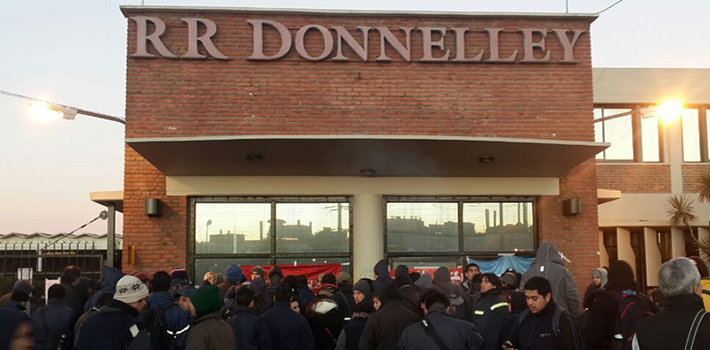
EspañolArgentina’s Federal Tax Authority (AFIP) has called for the arrest and imprisonment of the directors of the Argentinean branch of the multinational printing company RR Donnelley. The tax agency has accused the company of fraud, following a bankruptcy proceeding filed on August 9.
On August 14, President of Argentina Cristina Kirchner announced on national television that US shareholders of the printing company have ties to “vulture funds,” as holdouts who did not accept restructured debt bonds in 2005 and 2010. Kirchner said Donnelley’s bankruptcy is a maneuver to put the country “on its knees.”
Ricardo Echegaray, head of the AFIP, said at a press conference on Monday that the bankruptcy proceeding was “fraudulent” since there is “no economical or financial reason” behind it. Echegaray said Argentina’s tax authority responded by filing a complaint in commercial court on August 14.
On August 11, Donnelley closed its doors, and the company’s building has been occupied by 400 former employees ever since.
“We have requested the federal courts detain the company’s directors for fraud,” the Argentinean official said, adding he did not know the whereabouts of Donnelley’s management.
Para AFIP, la quiebra de Donnelley es fraudulenta y sus accionistas integran #FondosBuitre http://t.co/CGgzSECbdK pic.twitter.com/HrumKnsO73
— LOS ANDES (@LosAndesDiario) August 26, 2014
AFIP backs the complaints with documents that assert the company was not bankrupt, given its net assets of AR$183.8 million (US$14 million) and debts amounting to AR$145.2 million (US$11 million). According to Echegaray, another $AR20 million (US$1.53 million) was reserved for dividend payments and their solvency indexes were positive.
Echegaray added that Argentina’s Federal Tax Authority is even paying them US$1.1 million in pending refunds.
The head of the tax authority is confident that a judicial decision will revoke the company’s bankruptcy, and a trustee assigned by the judge can put the company back in business.
Echegaray called the speed with which Judge Gerardo Santicchia declared the bankruptcy suspicious. “He declared the bankruptcy on the same day [it was filed]. We analyzed cases from 2014, and of the 1,189 bankruptcies filed not even one was declared the same day.”
With regard to the alleged links between Donnelley’s hedge fund shareholders (BlackRock, Capital World Investors, and The Vanguard Group) and the so-called vulture funds, Echegaray made no comment on the theory that the bankruptcy was an effort to harm the country.
“Those funds are there. I can’t say anything else. This will all be figured out later,” he said.
La CNV presentará los antecedentes de quiebra fraudulenta de Donnelley http://t.co/sanpfm57Pw pic.twitter.com/DR7A0vyKYc
— Agencia Télam (@AgenciaTelam) August 25, 2014
Nevertheless, Echegaray confirmed there are no plans to nationalize the printing facilities because it is not an essential supplier of the state.
“The idea that the state will take over the company or turn it into a recovered factory has been ruled out,” he assured.
Echegaray said he has sent all documents related to the case to Argentina’s National Securities Commission (CNV). This commission will send a report to the US Securities and Exchange Commission, where the printing company is based, hoping they impose “a maximum penalty.”
Employees Struggle
Employees of the company supported the AFIP’s request to arrest the company’s management. “The bankruptcy is fraudulent, as the state points out. We demand the dismissal of the request, and the payment of our wages,” the group stated in a press release.
The plant has been closed since August 12, yet employees have not halted production.
“We are more than 400 families, which the company wanted to evict. But the workers reignited production and started to manage on our own. There is no way that we can allow these US vultures to leave us unemployed,” said Rene Córdoba, member of the union commission, to Télam news agency.
A Costly Move
Argentinean lawyer, Ezequiel Caffarini, explained to PanAm Post that there are two ways in which a company can opt out and close its doors in Argentina.
“In order to close a company, one should file a bankruptcy proceeding, or fire all the employees, compensate them, and then request the dissolution of the company at the General Inspection of Justice. The problem with the latter is that it is very expensive.”
He added that in some cases, medium-sized companies in this country decide to drain a company’s assets in preparation for closure. In other words, they sell them to friends and family.
The problem with bankruptcy, he concluded, is that it takes five or six years for the bankrupt company to divide the balance among all creditors.
In Argentina, fraudulent bankruptcy is punishable by up to six years in prison, according to Article 176 of the Criminal Code.
 Versión Español
Versión Español












